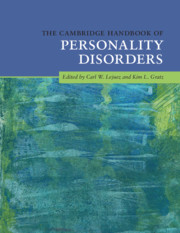Book contents
- The Cambridge Handbook of Personality Disorders
- The Cambridge Handbook of Personality Disorders
- Copyright page
- Contents
- Figures
- Tables
- Contributors
- Preface
- Part I Etiology
- Part II Models
- Part III Individual Disorders and Clusters
- Part IV Assessment
- Part V Treatment
- 17 Cognitive Behavioral Approaches
- 17a Applying a Cognitive-Behavioral, Principle-Based Approach to the Treatment of Personality Disorders: Commentary on Cognitive Behavioral Approaches
- 17b Implementation Challenges in Real World Settings: Commentary on Cognitive Behavioral Approaches
- 17c Further Considerations about Cognitive Behavioral Therapies and Personality Disorders: Author Rejoinder to Commentaries on Cognitive Behavioral Approaches
- 18 Psychoanalytic/Psychodynamic Approaches to Personality Disorders
- 18a Contemporary Psychodynamic Treatments: Commentary on Psychoanalytic/Psychodynamic Approaches to Personality Disorders
- 18b Consideration of Commonalities in Distinct Models of Treatment for Individuals with Borderline Personality Disorder: Commentary on Psychoanalytic/Psychodynamic Approaches to Personality Disorders
- 18c Further Development of Three Key Issues: Author Rejoinder to Commentaries on Psychoanalytic/Psychodynamic Approaches to Personality Disorders
- 19 Using DSM-5 and ICD-11 Personality Traits in Clinical Treatment
- 19a A Functional Understanding of the Relationship between Personality and Clinical Diagnoses and Implications for Treatment Planning: Commentary on Using DSM-5 and ICD-11 Personality Traits in Clinical Treatment
- 19b The Need for Mechanistic Models to Translate Traits from Bench to Bedside: Commentary on Using DSM-5 and ICD-11 Personality Traits in Clinical Treatment
- 19c Simplicity and Dynamics of the ICD-11 Trait Qualifiers in Relation to Treatment: Author Rejoinder to Commentaries on Using DSM-5 and ICD-11 Personality Traits in Clinical Treatment
- 20 Brief Therapeutic Approaches for Personality Disorders
- 20a What Knowledge Is Lacking on Brief Interventions for Personality Disorders and Why: Commentary on Brief Therapeutic Approaches for Personality Disorders
- 20b Short- and Long-Term Personality Disorder Treatment Studies Should Inform One Another: Commentary on Brief Therapeutic Approaches for Personality Disorders
- 20c Next Steps: Author Rejoinder to Commentaries on Brief Therapeutic Approaches for Personality Disorders
- 21 Recent Developments in the Pharmacologic Management of Personality Disorders
- 21a New Efforts towards Evidence-Informed Practice and Practice-Informed Research: Commentary on Recent Developments in the Pharmacologic Management of Personality Disorders
- 21b Considerations Regarding the Pharmacological Management of Personality Disorders: Commentary on Recent Developments in the Pharmacologic Management of Personality Disorders
- 21c Directions for Future Drug Trial Research: Author Rejoinder to Commentaries on Recent Developments in the Pharmacologic Management of Personality Disorders
- Index
- References
17c - Further Considerations about Cognitive Behavioral Therapies and Personality Disorders: Author Rejoinder to Commentaries on Cognitive Behavioral Approaches
from Part V - Treatment
Published online by Cambridge University Press: 24 February 2020
- The Cambridge Handbook of Personality Disorders
- The Cambridge Handbook of Personality Disorders
- Copyright page
- Contents
- Figures
- Tables
- Contributors
- Preface
- Part I Etiology
- Part II Models
- Part III Individual Disorders and Clusters
- Part IV Assessment
- Part V Treatment
- 17 Cognitive Behavioral Approaches
- 17a Applying a Cognitive-Behavioral, Principle-Based Approach to the Treatment of Personality Disorders: Commentary on Cognitive Behavioral Approaches
- 17b Implementation Challenges in Real World Settings: Commentary on Cognitive Behavioral Approaches
- 17c Further Considerations about Cognitive Behavioral Therapies and Personality Disorders: Author Rejoinder to Commentaries on Cognitive Behavioral Approaches
- 18 Psychoanalytic/Psychodynamic Approaches to Personality Disorders
- 18a Contemporary Psychodynamic Treatments: Commentary on Psychoanalytic/Psychodynamic Approaches to Personality Disorders
- 18b Consideration of Commonalities in Distinct Models of Treatment for Individuals with Borderline Personality Disorder: Commentary on Psychoanalytic/Psychodynamic Approaches to Personality Disorders
- 18c Further Development of Three Key Issues: Author Rejoinder to Commentaries on Psychoanalytic/Psychodynamic Approaches to Personality Disorders
- 19 Using DSM-5 and ICD-11 Personality Traits in Clinical Treatment
- 19a A Functional Understanding of the Relationship between Personality and Clinical Diagnoses and Implications for Treatment Planning: Commentary on Using DSM-5 and ICD-11 Personality Traits in Clinical Treatment
- 19b The Need for Mechanistic Models to Translate Traits from Bench to Bedside: Commentary on Using DSM-5 and ICD-11 Personality Traits in Clinical Treatment
- 19c Simplicity and Dynamics of the ICD-11 Trait Qualifiers in Relation to Treatment: Author Rejoinder to Commentaries on Using DSM-5 and ICD-11 Personality Traits in Clinical Treatment
- 20 Brief Therapeutic Approaches for Personality Disorders
- 20a What Knowledge Is Lacking on Brief Interventions for Personality Disorders and Why: Commentary on Brief Therapeutic Approaches for Personality Disorders
- 20b Short- and Long-Term Personality Disorder Treatment Studies Should Inform One Another: Commentary on Brief Therapeutic Approaches for Personality Disorders
- 20c Next Steps: Author Rejoinder to Commentaries on Brief Therapeutic Approaches for Personality Disorders
- 21 Recent Developments in the Pharmacologic Management of Personality Disorders
- 21a New Efforts towards Evidence-Informed Practice and Practice-Informed Research: Commentary on Recent Developments in the Pharmacologic Management of Personality Disorders
- 21b Considerations Regarding the Pharmacological Management of Personality Disorders: Commentary on Recent Developments in the Pharmacologic Management of Personality Disorders
- 21c Directions for Future Drug Trial Research: Author Rejoinder to Commentaries on Recent Developments in the Pharmacologic Management of Personality Disorders
- Index
- References
Summary
The commentaries from Gold, Yen, Hughes and Rizvi highlight the challenges associated with using cognitive behavioral therapies to treat individuals with personality disorders (PDs). In this rejoinder, the authors extend upon these observations by arguing the importance of a modular, principle-driven approach to assessment and treatment of PDs. First, they discuss how there is a greater demand for treatments beyond the current “branded” CBTs and their empirical basis. In light of this limitation, clinicians need to flexibly use empirically-supported principles of change to treat processes underlying personality dysfunction. This approach requires careful case formulation and identification of behaviorally-specific targets of treatment using validated screening tools. This approach to treatment may be a useful way of meeting the demands for both patient care and current trends in national health care payor reform.
Keywords
- Type
- Chapter
- Information
- The Cambridge Handbook of Personality Disorders , pp. 425 - 426Publisher: Cambridge University PressPrint publication year: 2020

